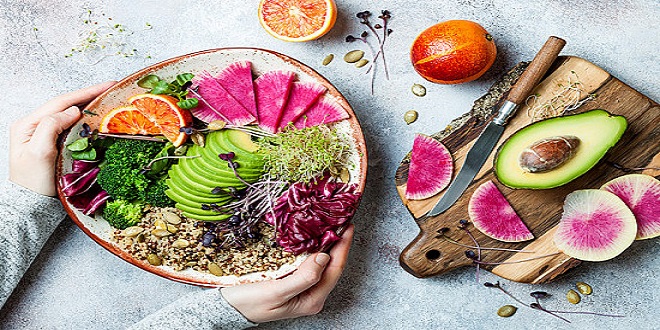Everything You Need to Know About The Vegan Diet

We offer information about the vegan diet, including contraindications and potential health consequences. Veganism, although there are many forms of vegetarianism, is the most restricted. It flows seamlessly into a unique way to live.
Vegans eat only animal-related foods. Vegan diets also ban gelatin, eggs, dairy products, and other animal-related foods. Proponents of the vegan diet go even further and refuse to purchase clothing, shoes, or any other animal products. The ban does not apply to entertainment such as online baccarat.
Most of the time, changing diets is done ethically. Plant-based diets can still be used to prevent chronic diseases and for weight loss.
What is veganism? Lifestyle and diet
Veganism was born as an offshoot from the ancient vegetarian diet in November 1944. However, the movement gained popularity after Donald Watson, a British carpenter, suggested it. At the time, a large percentage of British cows were suffering from tuberculosis.
Veganism can be chosen for many reasons. Veganism is more than a diet. It’s a holistic philosophy that leaves a smaller environmental footprint and does not harm our less fortunate brothers. A vegan diet is also healthy, especially for those who are prone to obesity and cardiovascular disease.
It is not an easy task. Veganism is a strict lifestyle. Poor planning can lead to vitamin deficiencies and other unfortunate health consequences.
Consider the possibility of isolation when you choose a vegan lifestyle. Your values may change the reaction of the meat-eating community to which you are a part. To avoid embarrassing situations, for example, your acquaintances may stop inviting you to the dinner party.
The pros and cons of the vegan diet
Veganism is perhaps the most controversial of all the popular diets. Both its supporters and foes defend their beliefs with almost religious passion.
Is veganism healthier than other ways to eat? It is a risky hobby. Is it a dangerous hobby? Veganism is not a one-size-fits all diet. It is like any other eating plan.
Prevention of Chronic Diseases.
People who don’t eat meat tend to have lower body mass and cholesterol, as well as a lower risk of developing diabetes, hypertension and heart disease. Vegans are also less likely to develop prostate cancer and colon cancer.
Plant-based foods also alter the microflora of the stomach, increasing the number of beneficial microorganisms, and suppressing opportunistic ones.
Weight loss
A vegan diet generally has lower calories and fats than a traditional one. Vegans are often able to lose weight quickly and maintain their ideal weight for long periods of time without having to exert too much physical effort.
Delicious, affordable food for every day.
Modern people are not able to afford to spend a lot on meat, poultry and fish. If done correctly, however, switching to a plant-based diet can have a positive effect on your health and wallet.
The need to supplement
A vegan diet has one major drawback: it is incomplete. People must purchase vitamin and mineral complexes to avoid nutritional deficiencies.
Vegans who are strict vegans may have trouble getting enough iron, iodine and calcium. You can get these nutrients from a plant-based diet, but not B12. Be careful about what you eat.
Vitamin B12 is only found in vitamin supplements for vegans or artificially fortified foods. Cyanocobalamin is not found in plant foods.
Junk food is still a problem
Veganism means avoiding all animal products. However, table salt, sugar and simple carbohydrate overload are still issues.
Animal ingredients can hide in surprising places like sugar. This leaves you with fewer options than other diets.
Baccarat online live may be a good choice for you if you’re interested in other pastimes than diets.
What vegan menus are available: What you can and cannot eat
Although a vegan diet can seem monotonous and boring, many of its advocates are always trying new recipes. Only one restriction: they must only be made from plant foods.
These are just a few of the foods you can eat:
- All kinds of vegetables and fruits: asparagus, zucchini lemons, apples, etc.
- Legumes include soybeans, chickpeas and red lentils.
- Oils, vinegars and any other fermented food.
- Sauces and condiments like ketchup or soy sauce.
- Seaweed is an excellent source of iodine.
- Spices and herbs, from dill bis barberry.
- All kinds of mushrooms.
- Anything else that comes from plants and not living things.
There are so many options, so it is no surprise that vegans enjoy many different foods. You can still enjoy classic foods such as cookies, pasta, and fried potatoes but with a healthier taste.
List of Prohibited Foods
What foods can vegans not eat? This diet does not include animals or any of their products. Vegans can’t eat meat, poultry or fish, nor milk, honey, or other dairy products.
These foods are exempt from the ban:
- Gelatin is a protein made from collagen from animal parts. It’s used in many sweets like fruit desserts and marmalade.
- Confectionery shellac: This common ingredient is derived from worm insects and can be found in chocolate, chewing gum and baked goods.
- Natural flavors are made from chicken and dairy products.
This list includes almost all processed foods that are not suitable for vegans.
Can I eat foods that are labeled “may have traces”?
This is a question that is often asked and is controversial, even within vegan circles.
A food product that does not contain milk, but is labeled “may contains milk” or traces from other animal products, is considered 100% vegan. Let’s find out why.
This does not mean the factory is adding milk to spite a technologist who is feeling bad. These foods are usually produced using standard equipment, which can lead to cross-contamination.
This warning is important for anyone allergic to milk products. It does not apply to vegans who do not want to consume or spend money on animal products.
Contraindications and Side Effects
The vegan diet is extreme and restrictive. It can also have side effects from nutrient deficiencies, and a bias towards certain plant foods (especially soy or other legumes).
Some side effects include:
- Hormonal dysfunctions: This problem is caused by excessive phytoestrogens found in soy, which is the main source of protein for vegans.
- Anemia can result from a lack of easily absorbable iron (animal) or vitamin B12.
- Depression: An excess of omega-6 acids is linked to depression, even though omega-3 acids are found primarily in fish.
- Osteoporosis is a condition where there is a reduction in bone density due to insufficient vitamin D, calcium, or protein intake.
- Zinc deficiency is when the body cannot absorb zinc due to the presence of phytic acid in plant foods.
- Veganism may not be for everyone. Some people can suffer irreparable harm by avoiding all animal nutrients.
Absolute contraindications
- Pregnancy and breastfeeding: A pregnant woman should eat a variety, including meat, to ensure that the growing baby has all the nutrients it needs.
- Adolescence and childhood: The period of intense growth and maturation puts increased demands on the diet. A vegan child is more likely to get anemia, grow slowly and have severe mental and physical disorders.
There are some conditions that can make veganism more difficult, such as gastrointestinal disorders and impaired nutrition absorption. People with hematopoiesis should avoid taking risks.
For those over 55 years of age, and especially if they’re overweight, switching to a plant based diet may be a good option. Vegans are able to lose weight and manage blood sugar and blood pressure easier than vegans.

